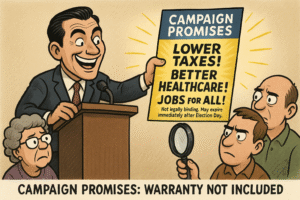Anger in America, Part 1: Why People Are So Angry
Anger doesn’t just happen in a vacuum. It builds. It festers. It grows out of a thousand little cuts and a handful of gaping wounds. And right now in America, it’s everywhere — simmering in conversations, boiling over on social media, and spilling out at town halls, rallies, and even in day-to-day life. The question is: why?
The truth is, millions of Americans feel cheated. They feel as if the deck is stacked against them, no matter how hard they work or how carefully they play by the rules. They see the system tilted toward insiders and special interests. They see rules bent and laws gamed. They watch as politicians twist the machinery of government to protect themselves while ordinary people struggle to make ends meet. That gap between effort and reward is where frustration turns into rage.
And the politicians don’t make it better. In fact, they make it worse. Instead of honesty, we get double talk. Instead of accountability, we get excuses. Instead of transparency, we get cover-ups. At some point, a citizen watching all this can’t help but feel powerless. And when people feel powerless, anger is the natural response.

This is not a partisan observation. Republicans and Democrats alike are furious. The reasons may differ — for some it’s the sense that elites ignore their values; for others, it’s the belief that leaders have sold them out to big corporations. But the common denominator is the same: distrust. And distrust corrodes everything it touches.
Then there’s the noise. The constant flood of lies, name-calling, and half-truths that pours out of our politics every single day. Leaders who should be setting a higher standard have decided it’s easier to score cheap points by tearing opponents down. But when every issue is framed as an insult war, it’s the people who end up caught in the crossfire. They don’t get solutions — they get slogans. They don’t get progress — they get poison.
It’s little wonder, then, that so many Americans feel they’ve had enough. Anger is not weakness here. It’s the logical response to being ignored, misled, and manipulated. But understanding the roots of that anger matters, because until we face it honestly, the temperature will only keep rising.
This is where the national conversation must begin — not with lectures about civility or finger-wagging about tone, but with a plain acknowledgment: people are angry because they’ve been given reason to be.


Comments are Disabled